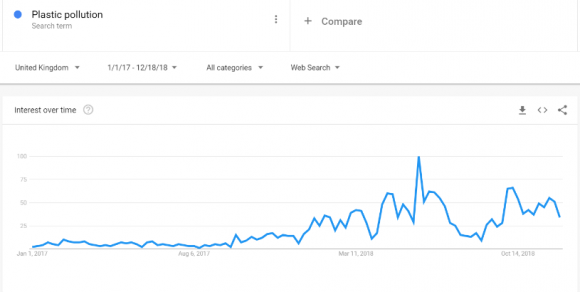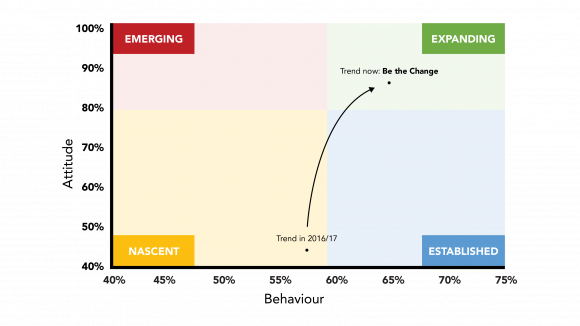
THE RISE OF ETHICAL CONSUMPTION
Ethical, purposeful and sustainable consumption have all been buzzwords of recent years. This is no new news to brands, and it is on the agenda for many to improve business practises to meet rising consumer demand. But what does this trend look like now? How fast is it really growing, and will the demand sustain over the coming years?
To answer these questions, we will draw upon the research and data from our relaunched trend model to discuss one of our new trends: ‘Be the Change’, and why it is especially important for food and drink brands.
THE NEW ‘WOKE’ CONSUMER
At Join the Dots, ethical consumption is something we have recognised in our trends model since it was established in 2014. We began quantifying our trends in 2016, so we now have three years of data to compare how ethical consumption has changed over time.
This year we have seen a fundamental shift. For the first time our UK nat rep data is seeing this trend move from ‘nascent’ to ‘expanding’ – suggesting the demand for ethical goods and purposeful brands is no longer something of fringe culture, but is instead spreading into the mainstream. (see graph below)
Alongside this, the manifestation of this trend has also developed. No longer reserved for the middle classes who can afford it, more consumers are looking to change consumption habits for the better, with 66% of the UK public “willing to spend more money on brands who aim to make a positive change in society.”
However, consumer trust in brands and governments to tackle social issues is in question. Instead consumers are increasingly looking to take charge and drive change themselves. Indeed, 88% of the UK public agreed “we must take action ourselves to address the social issues affecting us.” For brands, it is more important than ever to help drive positive social change, or risk consumer backlash or boycotting.
FOR FOOD & DRINK
Although this trend spans all industries, for Food and Drink brands this trend is particularly current given the continued rise of food and drink related issues – from food waste, through to animal welfare and environmentally-friendly packaging. FMCG products are quick to be targeted by consumers because they are sold at such large scale: they could either cause mass damage, or cause mass positive social change.
One key example is how quickly single use plastic rose in priority for both consumers and subsequently brands. Following documentaries Blue Planet II and Drowning in Plastic, consumer awareness of single-use plastics spiked and so did the passion to tackle the issue. Plastic became public enemy number one, and as a result we saw a flurry of brands seek to appease this consumer demand – from the planned plastic straw ban, through to over 40 companies (including Tesco, Lidl, Marks and Spencer, Waitrose, J Sainsbury, Unilever, Procter & Gamble and Coca-Cola) promising to ditch unnecessary and problematic single-use packaging by 2025 (Financial Times). Other brands like Walkers were specifically targeted by consumers due to their non-recyclable plastics, forcing the announcement they would make all their packaging 100 per cent recyclable or biodegradable by 2025.

PAVING THE WAY FORWARD
With social purpose rising in recent years, consumers are now suspicious; trying to distinguish the brands who genuinely care to those only wanting a profit. The real successful initiatives aren’t built from consumer backlash, but instead are pioneered by brands proactively helping society at a genuine, grassroots level.
Good examples of brands tapping into the trend include Manchester’s Bosu Body Bar – celebrated for leaving food and clothing for the local homeless. Hotpoint, the appliances brand, are similarly helping at a local level, creating pop up cafes to deal with food waste (all profits donated to FoodCycle).
Heineken are an example of a big, global brand tapping into this trend. In 2017, their Worlds Apart campaign was celebrated for its topical commentary on divisions within society. They also invest 10% of media budget on advertising to encourage responsible alcohol consumption, as well as investing €200m on a campaign to combat drink-driving. Whilst ultimately they are still an alcohol brand, they’re seeking to improve the conditions and reputation surrounding alcohol in a purposeful way.
Rather than simply creating a social campaign for marketing purposes, brands like this are tapping in to social issues relevant to their brand and their consumers, thus appearing more credible and genuine in their approach.

THE FUTURE OF THE TREND
Our data is showing ‘Be the Change’ is on an upward trajectory, and we predict this will only continue as consumers become more aware of societal issues. Whilst the trend is felt strongly across all demographics, it is most prevalent for the future generation: Gen Z (83% Gen Z, declining to over half of boomers at 56%). For brands, if we want to stay relevant to future consumers, we must look to be the change and help where governments and political systems are falling short. Cynical marketing ploys will be spotted, and brands who put their promotion second to tangible change will be most valued.
WANT TO KNOW MORE?
‘Be the Change’ is just one of our 14 brand new trends. We are excited to announce we will be launching the full set here on Illume Stories on the 14th January – stay tuned!
With each of our 14 trends quantified, we can help brands to understand the relevance of each trend by key demographics and segments. To understand how ‘Be the Change’ is relevant for your audience, contact us at: cultureandtrends@jointhedotsmr.com


